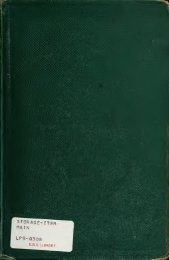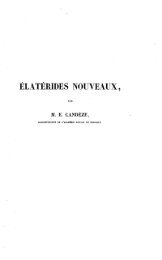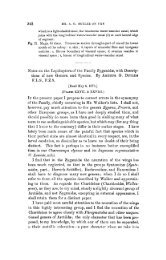- Page 2: Boston UniversityCollege of Liberal
- Page 10 and 11: Till. WOULD „» M Km 'ATI IK'S I'
- Page 12 and 13: 1IvWNrf*^ • '-^Taircecollection V
- Page 14 and 15: viPREFACE.past history of the earth
- Page 16 and 17: —viiiPREFACE.distribution of an o
- Page 18 and 19: PREFACE.therefore designed a series
- Page 20 and 21: xiiPREFACE.and conclusions would ha
- Page 22 and 23: ::::—::xivPREFACE.Professor Flowe
- Page 25 and 26: 2—CONTENTS OF THE EIEST VOLUME.PA
- Page 27 and 28: —CONTENTS OF THE FIRST VOLUME.xix
- Page 29: —CONTENTS OF THE FIRST VOLUME.xxi
- Page 33: THEGEOGRAPHICAL DISTRIBUTIONOF ANIM
- Page 36 and 37: 4 DISTRIBUTION OF ANIMALS. [part i.
- Page 38 and 39: 6 DISTRIBUTION OF ANIMALS. [part I.
- Page 40 and 41: 8 DISTRIBUTION OF ANIMALS. [part i.
- Page 42 and 43: CHAPTEE II.THE MEANS OF DISPERSAL A
- Page 44 and 45: ;12 DISTRIBUTION OF ANIMALS. [part
- Page 46 and 47: 14 DISTRIBUTION OF ANIMALS. [part i
- Page 48 and 49: ;16 DISTRIBUTION OF ANIMALS. [part
- Page 50 and 51: 18 DISPERSAL AND MIGRATION. [part i
- Page 54 and 55: ;22 DISPERSAL AND MIGRATION. [part
- Page 56 and 57: 24 DISPERSAL AND MIGRATION. [part I
- Page 58 and 59: 26 DISPERSAL AND MIGRATION. [part j
- Page 60 and 61: ;28 DISPERSAL AND MIGRATION. [part
- Page 62 and 63: 30 DISPERSAL AND MIGRATION. [part i
- Page 64 and 65: 32 DISPERSAL AND MIGRATION. [part i
- Page 66 and 67: 34 DISTRIBUTION OF ANIMALS. [part i
- Page 68 and 69: 36 DISTRIBUTION OF ANIMALS. [part r
- Page 70 and 71: 38 DISTRIBUTION OF ANIMALS. [part i
- Page 72 and 73: 40 DISTRIBUTION OF ANIMALS. [part i
- Page 74 and 75: 42 DISTRIBUTION OF ANIMALS. [part i
- Page 76 and 77: 44 DISTRIBUTION OF ANIMALS. [part i
- Page 78 and 79: —46 DISTRIBUTION OF ANIMALS. [par
- Page 80 and 81: ;48 DISTRIBUTION OF ANIMALS. [part
- Page 82 and 83: CHAPTER IV.ON ZOOLOGICAL REGIONS.To
- Page 84 and 85: ;52 DISTRIBUTION OF ANIMALS. [part
- Page 86 and 87: 54 DISTRIBUTION OF ANIMALS. [part i
- Page 88 and 89: 56 DISTRIBUTION OF ANIMALS. [part i
- Page 90 and 91: 58 DISTRIBUTION OF ANIMALS. [part i
- Page 92 and 93: ;GO DISTRIBUTION OF ANIMALS. [part
- Page 94 and 95: ;G2 DISTRIBUTION OF ANIMALS. [part
- Page 96 and 97: G4 DISTRIBUTION OF ANIMALS. [part i
- Page 98 and 99: ;GG DISTRIBUTION OF ANIMALS. [part
- Page 100 and 101: ;68 DISTRIBUTION OF ANIMALS. [part
- Page 102 and 103:
70 DISTRIBUTION OF ANIMALS. [part r
- Page 104 and 105:
72 DISTRIBUTION OF ANIMALS. [part I
- Page 106 and 107:
74 DISTRIBUTION OF ANIMALS. [part i
- Page 108 and 109:
76 DISTRIBUTION OF ANIMALS. [part i
- Page 110 and 111:
78 DISTRIBUTION OF ANIMALS. [part i
- Page 112 and 113:
;80 DISTRIBUTION OF ANIMALS. [part
- Page 114 and 115:
82 DISTRIBUTION OF ANIMALS. [part.
- Page 116 and 117:
84 DISTRIBUTION OF ANIMALS. [part i
- Page 118 and 119:
86 DISTRIBUTION OF ANIMALS. [part I
- Page 120 and 121:
131..88 DISTRIBUTION OF ANIMALS. [p
- Page 122 and 123:
,62.:90 DISTRIBUTION OF ANIMALS. [p
- Page 124 and 125:
.92 DISTRIBUTION OF ANIMALS. [part
- Page 126 and 127:
—94 DISTRIBUTION OF ANIMALS. [par
- Page 128 and 129:
:,Numidinae..:96 DISTRIBUTION OF AN
- Page 130 and 131:
—98 DISTRIBUTION OF ANIMALS. [PAR
- Page 132 and 133:
———100 DISTRIBUTION OF ANIMAL
- Page 134 and 135:
102 DISTRIBUTION OF ANIMALS. [part
- Page 136 and 137:
——104 DISTRIBUTION OF ANIMALS.
- Page 139 and 140:
CHAPTER VI.THE EXTINCT MAMMALIA OF
- Page 141 and 142:
;chap, vi.] MAMMALIA OF THE OLD WOR
- Page 143 and 144:
chap, vi.] MAMMALIA OF THE OLD WORL
- Page 145 and 146:
;chat, vi.] MAMMALIA OF THE OLD WOR
- Page 147 and 148:
chap, vi.] MAMMALIA OF THE OLD WORL
- Page 149 and 150:
——chap, vi.] MAMMALIA OF THE OL
- Page 151 and 152:
;chap, vi.] MAMMALIA OF THE OLD WOR
- Page 153 and 154:
chap, vi.] MAMMALIA OF THE OLD WORL
- Page 155 and 156:
chap, vi.] MAMMALIA OF THE OLD WORL
- Page 157 and 158:
chap, vi.] MAMMALIA OF THE OLD WORL
- Page 159 and 160:
;chap, vi.] MAMMALIA OF THE OLD WOR
- Page 161 and 162:
CHAPTEE VII.EXTINCT MAMMALIA OF THE
- Page 163 and 164:
chap. VII.] MAMMALIA OF THE NEW WOR
- Page 165 and 166:
chap, vii.] MAMMALIA OF THE NEW WOR
- Page 167 and 168:
chap, vii.] MAMMALIA OF THE NEW WOR
- Page 169 and 170:
chap, vii.] MAMMALIA OF THE NEW WOR
- Page 171 and 172:
;chap, vii.] MAMMALIA OF THE NEW WO
- Page 173 and 174:
chap, vii.] MAMMALIA OF THE NEW WOR
- Page 175 and 176:
chap, vii.] MAMMALIA OF THE NEW WOR
- Page 177 and 178:
;chap, vii.] MAMMALIA OF THE NEW WO
- Page 179 and 180:
—;chap, vii.] MAMMALIA OF THE NEW
- Page 181 and 182:
chap, vii.] MAMMALIA OF THE NEW WOR
- Page 183 and 184:
chap, vii.] MAMMALIA OF THE NEW WOR
- Page 185 and 186:
chap, vil] MAMMALIA OF THE NEW WORL
- Page 187 and 188:
Jchap. vii.MAMMALIA OF THE NEW WORL
- Page 189 and 190:
CHAPTER VIII.VARIOUS EXTINCT ANIMAL
- Page 191 and 192:
chap, viii.] MESOZOIC MAMMALIA. 159
- Page 193 and 194:
;chap, viii.] BIRDS. . 161as indica
- Page 195 and 196:
chap, vm.] BIRDS. 163discovered in
- Page 197 and 198:
chap, viii.] TERTIARY REPTILES. 1G5
- Page 199 and 200:
——;chap, vm.] ANTIQUITY OF INSE
- Page 201 and 202:
—chap, viii.] ANTIQUITY OF LAND S
- Page 203:
PART III.ZOOLOGICALGEOGRAPHY:AREVIE
- Page 206 and 207:
—174 ZOOLOGICAL GEOGRAPHY. |>art
- Page 208 and 209:
and176 ZOOLOGICAL GEOGRAPHY. [part
- Page 210 and 211:
;178 ZOOLOGICAL GEOGRAPHY. [part hi
- Page 212 and 213:
;CHAPTER X.THE PALiEAECTICREGION.Th
- Page 215 and 216:
;chap, x.] THE PALiEARCTIC REGION.
- Page 217 and 218:
——chap, x.] THE PAL.EARCTIC REG
- Page 219 and 220:
;chap. x.J THE PAL^ARCTIC REGION. 1
- Page 221 and 222:
—chap. x.J THE PALiEARCTIC REGION
- Page 223 and 224:
Ghap. x.] THE PAL^ARCTIC REGION. 18
- Page 225 and 226:
;chap, x.] THE PAL^IARCTIC REGION.
- Page 227 and 228:
chap, x.] THE PAL^ARCTIC REGION. 19
- Page 230 and 231:
-63
- Page 232 and 233:
—;,196 ZOOLOGICAL GEOGRAPHY. [par
- Page 234 and 235:
—198 ZOOLOGICAL GEOGRAPHY. [part
- Page 236 and 237:
200 ZOOLOGICAL GEOGRAPHY. [part in.
- Page 238 and 239:
202 ZOOLOGICAL GEOGRAPHY. [part hi.
- Page 240 and 241:
—;204 ZOOLOGICAL GEOGRAPHY. [part
- Page 242 and 243:
206 ZOOLOGICAL GEOGRAPHY. [part hi.
- Page 244 and 245:
208 ZOOLOGICAL GEOGRAPHY. [part hi.
- Page 246 and 247:
210 ZOOLOGICAL GEOGRAPHY. [part hi.
- Page 248 and 249:
212 ZOOLOGICAL GEOGRAPHY. [part hi.
- Page 250 and 251:
214 ZOOLOGICAL GEOGRAPHY. [part hi.
- Page 252 and 253:
216 ZOOLOGICAL GEOGRAPHY. [part hi.
- Page 254:
218 ZOOLOGICAL GEOGRAPHY. [part m.a
- Page 258 and 259:
;220 ZOOLOGICAL GEOGRAPHY. [part hi
- Page 260 and 261:
—;222 ZOOLOGICAL GEOGRAPHY. [part
- Page 262 and 263:
224 ZOOLOGICAL GEOGRAPHY. [PART III
- Page 264 and 265:
226 ZOOLOGICAL GEOGRAPHY [part hi.e
- Page 267 and 268:
;chap, x.] THE PALiEARCTIC REGION.
- Page 269 and 270:
chap, x.] THE PAL^ARCTIC REGION. 22
- Page 271 and 272:
chap, x.] THE PAL^EARCTIC REGION 23
- Page 273 and 274:
;chap, x.] THE PAL^ARCTIC REGION. 2
- Page 275 and 276:
CHAP. X.] THE PAL^ARCTIC REGION. 23
- Page 277 and 278:
CHAP. X.J
- Page 279 and 280:
.CHAP. X.] THE PAL.EARCTIC REGION.
- Page 281 and 282:
—CHAP. X.] THE PAL^ARCTIC REGION.
- Page 283 and 284:
CHAP. X.J THE PALiEARCTIC REGION. 2
- Page 285 and 286:
..)CHAP. X.] THE PAL.EARCTIC REGION
- Page 287 and 288:
CHAP. X.] THE PAL^ARCTIC REGION. 24
- Page 289 and 290:
CHAP. X.] THE PAL^IARCTIC REGION. 2
- Page 292 and 293:
5cpqa
- Page 294 and 295:
252 ZOOLOGICAL GEOGRAPHY. [part hi.
- Page 296 and 297:
—;254 ZOOLOGICAL GEOGRAPHY. [part
- Page 298 and 299:
;256 ZOOLOGICAL GEOGRAPHY. [part hi
- Page 300 and 301:
258 ZOOLOGICAL GEOGRAPHY. [part hi.
- Page 302:
—;260 ZOOLOGICAL GEOGRAPHY. [part
- Page 305 and 306:
chap, xi.] THE ETHIOPIAN REGION. 26
- Page 307 and 308:
;CHAP. XI.] THE ETHIOPIAN REGION. 2
- Page 311 and 312:
chap. xi.J THE ETHIOPIAN REGION. 26
- Page 313 and 314:
——chap, xi.] THE ETHIOPIAN REGI
- Page 315 and 316:
—chap, xi.] THE ETHIOPIAN REGION.
- Page 317 and 318:
;chap, xi.] THE ETHIOPIAN REGION. 2
- Page 319 and 320:
—CHAP. XI.] THE ETHIOPIAN REGION.
- Page 321 and 322:
;CHAP. XI.] THE ETHIOPIAN REGION. 2
- Page 323 and 324:
—CHAP. XI.] THE ETHIOPIAN KEGION.
- Page 325:
PLATE VI.SCENE IN MADAGASCAR, WITH
- Page 328 and 329:
—;280 ZOOLOGICAL GEOGRAPHY. [part
- Page 330 and 331:
282 ZOOLOGICAL GEOGRAPHY. [part in.
- Page 332 and 333:
:284 ZOOLOGICAL GEOGRAPHY. [part hi
- Page 334 and 335:
286 ZOOLOGICAL GEOGRAPHY. [part. hi
- Page 336 and 337:
288 ZOOLOGICAL GEOGRAPHY. [part m.a
- Page 338 and 339:
290 ZOOLOGICAL GEOGRAPHY. [part in.
- Page 340 and 341:
292 ZOOLOGICAL GEOGRAPHY. [part hi.
- Page 342 and 343:
.294 ZOOLOGICAL GEOGRAPHY. [PART I'
- Page 344 and 345:
.296 ZOOLOGICAL GEOGRAPHY. [PART II
- Page 346 and 347:
,298 ZOOLOGICAL GEOGRAPHY. [PART 11
- Page 348 and 349:
300 ZOOLOGICAL GEOGRAPHY. [PART III
- Page 350 and 351:
1302 ZOOLOGICAL GEOGRAPHY. [part II
- Page 352 and 353:
304 ZOOLOGICAL GEOGRAPHY. [PART 111
- Page 354 and 355:
306 ZOOLOGICAL GEOGRAPHY. [part III
- Page 356 and 357:
308 ZOOLOGICAL GEOGRAPHY. [part III
- Page 358 and 359:
.310 ZOOLOGICAL GEOGRAPHY. [PART 11
- Page 360 and 361:
312 ZOOLOGICAL GEOGEAPHY. [PART III
- Page 362:
CHAPTEE XII.THE ORIENTAL REGION.Thi
- Page 365 and 366:
;chap, xii.] THE ORIENTAL REGION. 3
- Page 367 and 368:
chap, xii.] THE ORIENTAL REGION. 31
- Page 369 and 370:
chap, xii.] THE ORIENTAL REGION. 31
- Page 371 and 372:
chap, xii.] THE ORIENTAL REGION. 32
- Page 373 and 374:
chap, xii.] THE ORIENTAL REGION. 32
- Page 375 and 376:
chap, xii.] THE ORIENTAL REGION. 32
- Page 377 and 378:
—chap, xii.] THE ORIENTAL REGION.
- Page 379 and 380:
chap, xii.] THE ORIENTAL REGION. 32
- Page 382 and 383:
Tm:aa #liFf;**!.'' liF* -H
- Page 384 and 385:
—;;332 ZOOLOGICAL GEOGRAPHY. [par
- Page 386 and 387:
'334 ZOOLOGICAL GEOGRAPHY. [part hi
- Page 388:
336 ZOOLOGICAL GEOGRAPHY. l^rt hi.g
- Page 391 and 392:
;chap, xii.] THE ORIENTAL REGION. 3
- Page 393 and 394:
chap, xii.] THE OEIENTAL REGION. 33
- Page 395:
PLATE IX.A MALAYAN FOREST, WITH SOM
- Page 398 and 399:
;342 ZOOLOGICAL GEOGRAPHY. [part hi
- Page 400 and 401:
344 ZOOLOGICAL GEOGRAPHY. [part hi.
- Page 402 and 403:
346 ZOOLOGICAL GEOGRAPHY. [part hi.
- Page 404 and 405:
——348 ZOOLOGICAL GEOGRAPHY. [pa
- Page 406 and 407:
;350 ZOOLOGICAL GEOGRAPHY. [part hi
- Page 408 and 409:
——352 ZOOLOGICAL GEOGRAPHY. [pa
- Page 410 and 411:
—354 ZOOLOGICAL GEOGRAPHY. [part
- Page 412 and 413:
356 ZOOLOGICAL GEOGRAPHY. [part Hi,
- Page 414 and 415:
358 ZOOLOGICAL GEOGRAPHY. [part in.
- Page 416 and 417:
;360 ZOOLOGICAL GEOGRAPHY. [past hi
- Page 418 and 419:
—302 ZOOLOGICAL GEOGRAPHY. [part
- Page 420 and 421:
364 ZOOLOGICAL GEOGEAPHY. [part in.
- Page 422 and 423:
.i366 ZOOLOGICAL GEOGEAPHY. [PART I
- Page 424 and 425:
368 ZOOLOGICAL GEOGEAPHY. [PART III
- Page 426 and 427:
370 ZOOLOGICAL GEOGRAPHY. [PART III
- Page 428 and 429:
372 ZOOLOGICAL GEOGRAPHY. [PART III
- Page 430 and 431:
374 ZOOLOGICAL GEOGRAPHY. [PAET III
- Page 432 and 433:
376 ZOOLOGICAL GEOGRAPHY. [part hi.
- Page 434 and 435:
:378 ZOOLOGICAL GEOGKAPHY. [PART II
- Page 436 and 437:
380 ZOOLOGICAL GEOGRAPHY. [PART III
- Page 438 and 439:
.The382 ZOOLOGICAL GEOGRAPHY. [PART
- Page 440 and 441:
N.384 ZOOLOGICAL GEOGRAPHY. [part n
- Page 442 and 443:
386 ZOOLOGICAL GEOGRAPHY. [PART III
- Page 445 and 446:
CHAPTER XIII.THE AUSTRALIAN EEGION.
- Page 447 and 448:
;chap, xiii.] THE AUSTRALIAN REGION
- Page 449 and 450:
;chap, xiii.] THE AUSTKALIAN REGION
- Page 451 and 452:
chap, xin.] THE AUSTRALIAN REGION.
- Page 453 and 454:
chap, xiii.] THE AUSTRALIAN REGION.
- Page 455 and 456:
——chap, xiii.] THE AUSTRALIAN R
- Page 457 and 458:
;chap, xni.] THE AUSTRALIAN REGION.
- Page 459 and 460:
chap, xiii.] THE AUSTRALIAN REGION.
- Page 461 and 462:
chap, xiii.] THE AUSTKALIAN REGION.
- Page 463 and 464:
;chap, xin.] THE AUSTRALIAN REGION.
- Page 465 and 466:
—chap, xiii.] THE AUSTRALIAN REGI
- Page 467 and 468:
chap, xiii.] THE AUSTRALIAN REGION.
- Page 469 and 470:
..CHAP. XIII.] THE AUSTRALIAN REGIO
- Page 471 and 472:
chap, xiii.] THE AUSTRALIAN REGION.
- Page 474 and 475:
-^PLATE X.z^f-^
- Page 476 and 477:
———416 ZOOLOGICAL GEOGRAPHY.
- Page 478 and 479:
——418 ZOOLOGICAL GEOGRAPHY. [pa
- Page 480 and 481:
420 ZOOLOGICAL GEOGRAPHY. [part hi.
- Page 482 and 483:
422 ZOOLOGICAL GEOGEAPHY. [part hi.
- Page 484 and 485:
:424 ZOOLOGICAL GEOGRAPHY. [part hi
- Page 486 and 487:
—426 ZOOLOGICAL GEOGRAPHY. [part
- Page 488 and 489:
—;428 ZOOLOGICAL GEOGRAPHY. [past
- Page 490 and 491:
430 ZOOLOGICAL GEOGRAPHY. [part III
- Page 492 and 493:
:.432 ZOOLOGICAL GEOGRAPHY. [part i
- Page 494 and 495:
—434 ZOOLOGICAL GEOGRAPHY. [part
- Page 496 and 497:
436 ZOOLOGICAL GEOGRAPHY. [part hi.
- Page 498:
438 ZOOLOGICAL GEOGRAPHY. [part hi.
- Page 502 and 503:
:440 ZOOLOGICAL GEOGRAPHY. [part hi
- Page 504 and 505:
442 ZOOLOGICAL GEOGKAPHY. [part in.
- Page 507 and 508:
———chap, xin.] THE AUSTRALIAN
- Page 509 and 510:
—;chap, xiu.] THE AUSTRALIAN REGI
- Page 511 and 512:
—;chap, xiii.] THE AUSTRALIAN REG
- Page 513 and 514:
chap, xiii.] THE AUSTRALIAN REGION.
- Page 515 and 516:
—:;chap, xni.] THE AUSTEALIAN REG
- Page 517 and 518:
—chap, xiii.] THE AUSTRALIAN REGI
- Page 521 and 522:
;chap, xiii.] THE AUSTRALIAN REGION
- Page 523 and 524:
chap, xin.] THE AUSTRALIAN REGION.
- Page 525 and 526:
—chap, xiii.] THE AUSTRALIAN REGI
- Page 527 and 528:
chap, xni.] THE AUSTRALIAN REGION.
- Page 529 and 530:
—chap, xiii.] THE AUSTRALIAN REGI
- Page 531 and 532:
chap, xiu.] THE AUSTRALIAN REGION.
- Page 533 and 534:
chap, xiii.] THE AUSTRALIAN REGION.
- Page 535 and 536:
...CHAP. XIII.] THE AUSTRALIAN REGI
- Page 537 and 538:
iCHAP. XIII.] THE AUSTRALIAN REGION
- Page 539 and 540:
.CHAP. XIII.] THE AUSTRALIAN REGION
- Page 541 and 542:
CHAP. XIII.] THE AUSTRALIAN REGION.
- Page 543 and 544:
CHAP. XIII.] THE AUSTRALIAN REGION.
- Page 545 and 546:
CHAP. XIII.] THE AUSTRALIAN REGION.
- Page 547 and 548:
.(HAP. XIII.] THE AUSTRALIAN REGION
- Page 549 and 550:
CHAP. XIII.] THE AUSTRALIAN REGION.
- Page 551:
CHAP. XIII.] THE AUSTRALIAN REGION.
- Page 555 and 556:
INDEX TO VOL. I.Note.—In this Ind
- Page 557 and 558:
AmericanINDEX.491Birds, Oriental ge
- Page 559 and 560:
INDEX. 493Deer, fossil in N. Americ
- Page 561 and 562:
INDEX. 495Grallae, peculiar Orienta
- Page 563 and 564:
INDEX. 497Leptosomus, allied form i
- Page 565 and 566:
INDEX. 499Nannhyus, N. American Ter
- Page 567 and 568:
INDEX. 501Region, the best term for
- Page 569 and 570:
INDEX. 503I JJngulata, antiquity of












